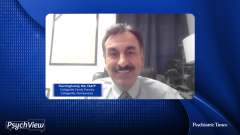
Co-occurrence of Insomnia With Other Health Conditions and Risk Factors and Triggers for Insomnia
Experts review the co-occurrence of insomnia with other medical conditions and discuss risks and triggers that lead to insomnia, such as age and psychiatric conditions.
Episodes in this series

Paul Doghramji, MD, FAAFP: Interestingly, insomnia when it occurs, at least I know in primary care, but also you’ll share with me as well, Leslie, about your practice, insomnia rarely occurs by itself. It seems to have co-occurrences with medical conditions and psychiatric conditions. I know that 30%, 40% of patients with insomnia have psychiatric disorders, and a lot of them also have medical conditions. Isn’t that correct?
Leslie Citrome, MD, MPH: Absolutely. We can take a look at research that’s been done looking at, for example, the odds ratio of having heart disease, cancer, high blood pressure, and so on, and insomnia. Basically, people with chronic health conditions also have insomnia disorder, and they’re more likely to have insomnia disorder than the general population. If we look at the psychiatric population, it’s really interesting because insomnia or difficulty with sleep is part of the diagnostic criteria for many conditions. But people can actually meet the full diagnostic criteria for insomnia disorder in addition to meeting the criteria for, let’s say, major depressive disorder, schizophrenia, bipolar disorder, or some anxiety disorder. There was an interesting cross-sectional study done of outpatients in Singapore where they calculated the percentage of people with major mental disorders, who also had DSM-5 [Diagnostic and Statistical Manual of Mental Disorders, Fifth Edition] insomnia disorder. It’s basically 1 out of 2 people with major depressive disorder also meet the full criteria for insomnia disorder. It’s 1 out of 4 of those with schizophrenia, and 1 out of 3 for those with an anxiety disorder. So it is a very common comorbidity.
Paul Doghramji, MD, FAAFP: Let’s also not forget that it’s common also in medical comorbidities like COPD [chronic obstructive pulmonary disease], obstructive sleep apnea, chronic pain, coronary artery disease, stroke, and neurologic conditions. A lot of insomnia is occurring in a lot of medical conditions.
Let’s talk about the triggers and risk factors for insomnia. Who gets insomnia? Who is at highest risk, Leslie, of getting insomnia?
Leslie Citrome, MD, MPH: The older you are, the higher the risk. If we look at the whole population, the prevalence of insomnia disorder is higher for older people. It’s also higher in women than in men. We know that much. If you have a medical or psychiatric condition, as we mentioned, that also increases your risk. I’d like to address this issue of sleep and psychiatric conditions because I find as a practicing psychiatrist, it’s very helpful to know if someone has a problem with their sleep. I use it as the canary in the coal mine, so to speak. If someone who’s doing reasonably well all of a sudden has trouble sleeping, I think that maybe this is a sign of things to come, and I need to be prepared for addressing a potential recurrence of their, let’s say, depressive disorder.
So sleep is a problem, and it can also be used diagnostically to help prognosticate how someone is going to do in the future. We know there’s this bidirectionality. I know we’ll talk a bit more about this later, but it’s incredibly important for me as a psychiatrist to acknowledge that and know that insomnia is associated with, let’s say, a 4-fold relative risk of new-onset major depressive disorder. It’s a robust predictor of depression relapse, as I mentioned before. Unfortunately, insomnia often persists once the acute depressive episode has essentially resolved itself. I can help patients along with their mood, their concentration; sometimes though the sleep problem persists, and I have to think of something beyond the treatment that I had used to treat their depressive symptoms.
Paul Doghramji, MD, FAAFP: As far as medical problems go, we all know that insomnia, poor sleep, not sleeping well for a long period of time, increases the probability of medical problems, whether it’s weight gain, diabetes, or cardiovascular disease. There’s a lot of evidence suggesting that when you don’t get a good night’s sleep and for a long enough period of time, that bad things can also happen medically.
Transcript edited for clarity
Newsletter
Receive trusted psychiatric news, expert analysis, and clinical insights — subscribe today to support your practice and your patients.










